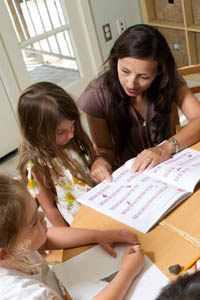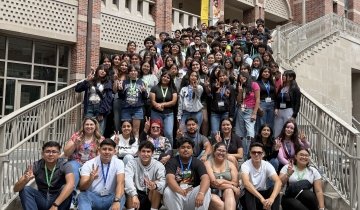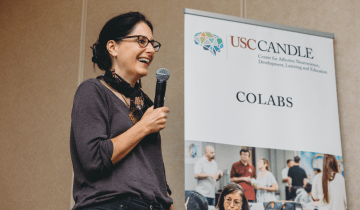
According to the International Society for the Learning Sciences (ISLS), research in the learning sciences centers “on how people learn alone and in collaborative ways, as well as on how learning may be effectively facilitated by different social and organizational settings and new learning environment designs.”
The Rossier School has consistently maintained a strong interest in learning as the foundation of its educational programs at all degree levels. There have been various names for the group of faculty most closely associated with this area, including Educational Psychology and Technology, Learning and Instruction, and most recently, Psychology in Education. However, the strong focus on learning and motivation has been constant over time.
In some universities, faculty members who teach this content are relegated to teaching large “service” courses or methodology courses to other specializations or departments. At the Rossier School, however, faculty members in this area are actively involved in teaching and program development in every degree program offered at the master’s and doctoral levels. It was no accident that the major restructuring undertaken by Rossier a decade ago identified Learning as the first of four cornerstones (Learning, Leadership, Accountability, Diversity) upon which new programs have been built.
Significant developments have occurred within the field itself, many prompted by forces outside the field. For example, accountability demands and pressures to increase academic achievement have increased. At the same time, problems have become much more complex – what some have called “wicked” problems. There are calls for researchers to become more involved in real-world problems that children, families, and schools face – to produce research “that matters.”
There are other changes afoot. Researchers have realized that findings from tightly controlled laboratory experiments do not often map on to real-world situations or offer practical solutions.
The methodologies and frameworks that have been favored in the field have often minimized or ignored the influences of social context, the social and collaborative nature of learning, and factors such as language and cultural differences. More importantly, the “one-shot” experiment designed to solve a problem often needs much more refinement before it can be used in practice, and in the past intervention research has often been designed without the collaboration of those most impacted by the research. Finally, it is increasingly apparent that educational challenges are global and require interdisciplinary solutions.
At the Rossier School, we have faculty who directly address these challenges in their work. We have increasingly looked to the developing area of Learning Sciences as a model for how we operate. The Learning Sciences seek to address the challenges noted above through practitioner and researcher collaborative design and evaluation of effective technology-enhanced learning environments, and also present an important middle ground between experimental and naturalistic approaches.
Many Rossier faculty are engaged in Learning Sciences research closely connected to real-world practice.
Dr. Gale Sinatra is engaged in the design of serious web-based games that are both engaging and informative. Losing the Lake, provides a simulation game experience to middle-schoolers learning about the effect of climate change on declining Lake Mead water levels.
Dr. Harry O’Neil specializes in computer-based teaching and assessment of 21st Century Skills (e.g., adaptive problem solving), teaching and assessment of self-regulation skills, such as metacognition, and the effectiveness of computer simulations and games to solve education and training problems in fields such as medicine.
Dr. Robert Rueda focuses on sociocultural factors in learning and motivation, exploring how motivational factors influence student engagement. He is currently synthesizing work on motivational interventions in school settings.
Dr. Allen Munro develops technologies that support learning in the context of interactive simulations. Explanations, demonstrations, and practice in making decisions can be supported in simulation contexts. At present, he is working on these issues in the domain of Navy tactics in a simulator that supports a “what-if ” approach to tactical planning.



